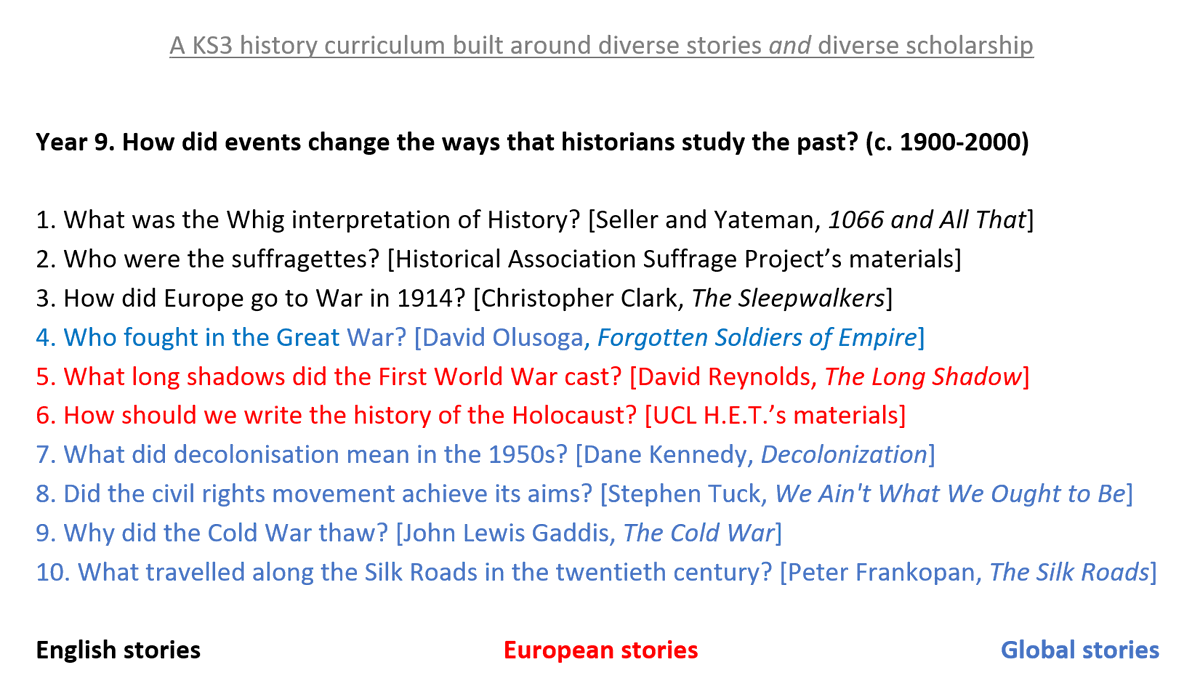Here goes...
*draft KS3 curriculum*
N.B. Most of it is built on fab work in @histassoc& #39;s Teaching History - by too many brilliant people to name here.
Each enquiry is 3-6 lessons long (no lesson questions). I& #39;ve also tried to have an & #39;overarching theme& #39; for each year.
Y7 ~
*draft KS3 curriculum*
N.B. Most of it is built on fab work in @histassoc& #39;s Teaching History - by too many brilliant people to name here.
Each enquiry is 3-6 lessons long (no lesson questions). I& #39;ve also tried to have an & #39;overarching theme& #39; for each year.
Y7 ~
What I& #39;ve tried to do is take the & #39;scholarship turn& #39; that& #39;s so evident on Twitter and in Teaching History to its logical conclusion. I& #39;ve used real historians& #39; debates to think about what disciplinary knowledge I will teach. I& #39;ve also tried to select *diverse* scholarship.
There are: cultural historians (because so much modern history writing is cultural); Marxist social and economic historians; Whigs; neo-narrativists; post-colonial historians; classicists; and a few TV historians. This means that pupils encounter diverse disciplinary methods.
The second-order concepts did feature in my thinking, but not beyond & #39;what is this question asking?& #39; and & #39;is this a good question about change, causation etc?& #39;. The substantive content - the actually issues the historians were debating - took priority over curricular proxies.
There are some shoddy omissions, no doubt (pre-colonial Africa isn& #39;t studied in its own right, but would feature in the & #39;Silk Roads& #39; EQ). Y9 is also weaker (I know less C20th historiography). But by doing short enquiries - not one per half term - you can cover a lot of stuff.
I& #39;ve thought a lot about & #39;who has agency& #39; when planning this. There are very few & #39;classic& #39; causation questions, because very few historians subscribe to E.H. Carr& #39;s models anymore. They are almost 60 years old, and were actually seen as very controversial in 1961!
Instead, I& #39;ve tried to give agency to people, especially & #39;ordinary people& #39;. A lot of the enquiries ask & #39;What did X mean to Y?& #39;. That& #39;s deliberate. By asking children about the ideas of past actors, you force them to humanise these people. It shows pupils that they could think.
The exploration of & #39;meanings& #39; is central to the cultural turn (stems from Geertz& #39;s work). @MonsieurBenger& #39;s forthcoming article on this in TH179 will, I& #39;m sure, put this better than I possibly could.
Finally, I& #39;ve tried to have EQs that deliberately recall stories from earlier ones. Examples:
Y7 - Renaissance re-heats knowledge of Greece and Rome.
Y8 - The word & #39;revolution& #39; gains multiple, overlapping meanings.
Y9 - The last & #39;Silk Roads& #39; enquiry ties the year together.
Y7 - Renaissance re-heats knowledge of Greece and Rome.
Y8 - The word & #39;revolution& #39; gains multiple, overlapping meanings.
Y9 - The last & #39;Silk Roads& #39; enquiry ties the year together.
So, this is what I& #39;ve come up with so far. It& #39;s still a work in progress, because curriculum is never finished. I& #39;m sharing all this to learn from other people, and to get more cultural history & #39;out there& #39;.
Please let me know what you think, what I& #39;ve missed and what looks OK.
Please let me know what you think, what I& #39;ve missed and what looks OK.

 Read on Twitter
Read on Twitter




